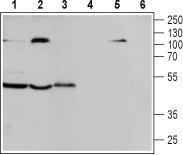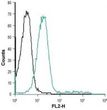CCR7 Rabbit Polyclonal Antibody
Frequently bought together (3)
beta Actin Mouse Monoclonal Antibody, Clone OTI1, Loading Control
USD 200.00
Other products for "CCR7"
Specifications
| Product Data | |
| Applications | FC, WB |
| Recommended Dilution | WB: 1:200-1:2000; IHC: 1:100-1:3,000; FC: 1:50-1:600 |
| Reactivities | Human, Mouse |
| Host | Rabbit |
| Clonality | Polyclonal |
| Immunogen | Peptide (C)DEVTDDYIGDNTTVD, corresponding to amino acid residues 26-40 of human CCR7. Extracellular, N-terminus. |
| Formulation | Lyophilized. Concentration before lyophilization ~0.8mg/ml (lot dependent, please refer to CoA along with shipment for actual concentration). Buffer before lyophilization: Phosphate buffered saline (PBS), pH 7.4, 1% BSA, 0.05% NaN3. |
| Reconstitution Method | Add 50 ul double distilled water (DDW) to the lyophilized powder. |
| Purification | Affinity purified on immobilized antigen. |
| Conjugation | Unconjugated |
| Storage | Store at -20°C as received. |
| Stability | Stable for 12 months from date of receipt. |
| Gene Name | C-C motif chemokine receptor 7 |
| Database Link | |
| Background | Chemokines (CHEMOtactic cytoKINES) are an important subgroup of the inflammatory cytokine family. More than fifty chemokines are expressed in mammalian cells and are characterized by their relatively small size (~70-90 amino acids), by their conserved N-terminus and cysteine motifs. This group of proteins has been further categorized on the basis of the cysteine spacing in the motifs creating C, CC, CXC, and CX3C chemokine subfamilies. All fifty chemokines exert their effects through twenty different chemokine receptors, belonging to the superfamily of G-protein coupled receptors (GPCRs) suggesting a certain level of promiscuity among the different receptors. All chemokine receptors couple to the pertussis sensitive Gi protein leading to phospholipase C activation and adenylate cyclase inhibition. Chemokines were first identified by their ability to mediate leukocyte chemoattraction. Apart from regulating the migration of leukocytes, they seem to be major players during inflammation and immunity. Indeed, chemokines could also be further classified as being inflammatory as many chemokines are extensively upregulated in response to inflammation, or housekeeping important for the homeostasis of certain cell types. Inflammatory chemokines are responsible for recruiting immune cells to the inflamed region, and housekeeping chemokines, expressed in lymphoid or non-lymphoid tissues mediate the trafficking and targeting of cells. In general, chemokines and their receptors guide leukocytes to sites of infection/inflammation. However, cases of chronic inflammatory disease and tissue damage occur when there is excessive recruitment of leukocytes. They could also be involved in the pathogenesis of neurological diseases like multiple sclerosis and many inflammatory diseases like atherosclerosis and inflammatory bowel disease. Recently, chemokines and their receptors have been found to be involved in cancer metastasis, namely breast cancer. The chemokine signaling also seems to be important for the communication between neural cells and the immune system, especially in the context of infection. CCR7 receptor is responsible for directing dendritic cell migration to the lymph nodes where they are important for initiating the immune response. This receptor has two ligands, CCL19 and CCL21 which are expressed by stromal cells in the T cell-rich lymph node area. |
| Synonyms | BLR2; CD197; CDw197; CMKBR7; EBI1 |
| Reference Data | |
| Protein Families | Druggable Genome, GPCR, Transmembrane |
| Protein Pathways | Chemokine signaling pathway, Cytokine-cytokine receptor interaction |
Documents
| Product Manuals |
| FAQs |
| SDS |
{0} Product Review(s)
0 Product Review(s)
Submit review
Be the first one to submit a review
Product Citations
*Delivery time may vary from web posted schedule. Occasional delays may occur due to unforeseen
complexities in the preparation of your product. International customers may expect an additional 1-2 weeks
in shipping.






























































































































































































































































 Germany
Germany
 Japan
Japan
 United Kingdom
United Kingdom
 China
China




